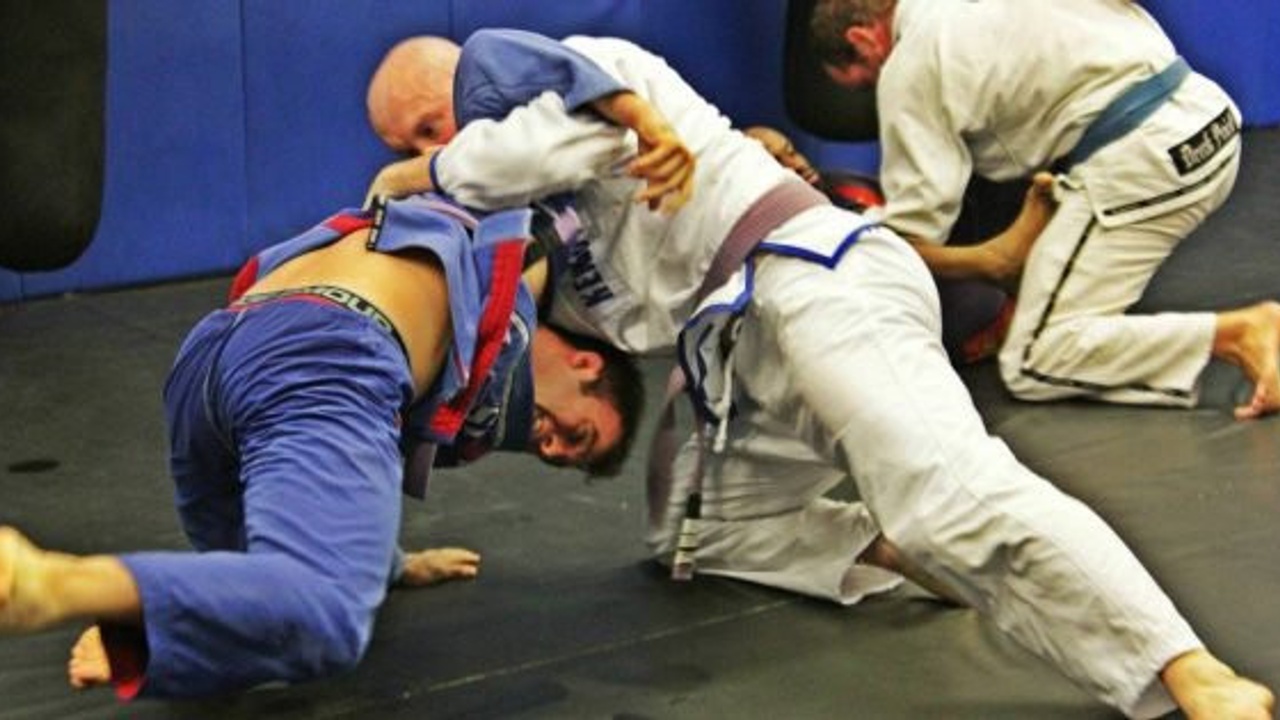
4 Simple Tips for Aging Athletes
By Andrew Read
Martial arts is one of those things that encompasses all elements of physical preparation. You simply can’t be only strong, or only flexible. You need it all – strength, power, speed, endurance, stamina, flexibility, balance, and co-ordination .
But you’re not a young man anymore. You’ve changed over the years. You’re still just as serious about training as you were ten years ago but your body can’t take it like it used to.
Your heart says, “get on the mat” but your brain says, “go to yoga”.
So how do you combine the two? How do you combine the desire to train hard as often as you can with an intelligent approach that allows you to train often without falling in a heap?
There are plenty of ways to structure training but very few that actually work well for an aging athlete. The reason for this is that most training plans only focus on training. As we get older there are supplementary elements that become more and more important. In your 20s and 30s you can ignore these. But as you get older you can’t out run these variables.
So here are 4 things you can do to stay in shape to train as you get older:
1. Sleep
 Modern life is stressful. We are expected to be at everyone’s beck and call 24/7. Email, messenger, text messages, voice mail—the number of ways someone can reach out is endless. And with instant messaging comes the expectation of an instant response. Next thing you know, it’s 10pm on Sunday night and you’re answering work emails instead of peacefully sleeping.
Modern life is stressful. We are expected to be at everyone’s beck and call 24/7. Email, messenger, text messages, voice mail—the number of ways someone can reach out is endless. And with instant messaging comes the expectation of an instant response. Next thing you know, it’s 10pm on Sunday night and you’re answering work emails instead of peacefully sleeping.
But sleep is the single-most anabolic thing we can do for our body. It’s how we reboot the system after a day of work and activity. It helps muscles grow and allows us to come back better and stronger the next day.
The easiest way to see how important sleep is for us is to look at the impact not sleeping enough can have.
Here are some problems caused by inadequate sleep:
- Irritability
- Cognitive impairment and memory loss
- Impaired moral judgement
- Hallucinations
- ADHD-like symptoms
- Impaired immune system
- Increased risk of type 2 diabetes
- Increased risk of heart disease
- Decreased heart rate variability
- Decreased reaction time
- Muscle tremors and aches
- Increased risk of obesity
- Growth suppression
If you want to be an athlete you need to act like one and that means going to bed and getting 7-9 hours of sleep every night.
2. Remove training stress
 Life is pretty hectic. It’s fast paced, stress-filled, and often we use our martial practice to get it all out of our system. Win or lose, time on the mats is always cathartic.
Life is pretty hectic. It’s fast paced, stress-filled, and often we use our martial practice to get it all out of our system. Win or lose, time on the mats is always cathartic.
But the body doesn’t differentiate between training stress and work stress. All it feels is stress, and it deals with it all the exact same way.
Given you can’t change work stress in most cases the only reliable way you have to moderate the amount of stress in your life is to change the amount of training stress you expose yourself to. Getting sweaty can make you feel good right now, but in the longer term may just make things worse.
So how do you make some intelligent training decisions that will both satisfy your emotionally while not breaking you down further physically?
My first suggestion is to track Heart Rate Variability. HRV is a measurement of the balance between the fight or flight side of your nervous system and the rest and digest side. We obviously need both but modern life has us stuck in the same panic mode all the time as if we were in a fight for our lives.
By tracking HRV we can get a sense of what is normal for you and what is rested or stressed.
On days where you see a big drop in HRV you should choose the following instead of hard training:
If you have a martial practice planned drill only. Yes, I know rolling is the fun bit but if you drill only your body will come back to normal faster.
If you have a strength session planned do 70& of the volume and 70% of the loads. That means that if you planned to lift 100kg for 5 sets of 5 you should instead choose to do 70kg for 3 sets of 3 reps. The net effect of this will be a workout that feels like an extended warm up, which is exactly what your body needs.
If you have an intense conditioning session planned drop that in favor of an easy Maffetone style session (where max heart rate will be 180 – age in beats per minute).
If HRV stays low for two consecutive days drop all training and go for a walk instead.
Walking has a very positive effect on the CNS and there are studies to show that a walk in nature, like a park or forest, has a significant positive effect on the nervous system.
Another great tool to reduce CNS stress is flexion-based stretching. That’s a fancy way of saying yoga. All those downward dogs, and deep forward bends coupled with rhythmic diaphragmatic breathing have a calming effect on the system.
3. Reduce overall training load
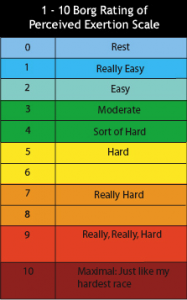 I know there are plenty of freaks in the MMA and BJJ worlds. But there’s a fair chance you’re not one of them. And because combat sports are so hard – you can tell because masters’ divisions start a full five years before they do for other sports in BJJ – you will need to be far smarter about your training once you hit the ripe old age of thirty-five.
I know there are plenty of freaks in the MMA and BJJ worlds. But there’s a fair chance you’re not one of them. And because combat sports are so hard – you can tell because masters’ divisions start a full five years before they do for other sports in BJJ – you will need to be far smarter about your training once you hit the ripe old age of thirty-five.
I see a lot of guys hitting the gym a lot in the hopes of improving their on the mat performance. But it’s going to be hard to wrestle well or move fluidly when you’re exhausted or so sore you can barely walk. You have to decide if you’re a combat sports athlete who lifts for improved performance, or a lifter who does BJJ for some fitness cross training.
If you’re smart in the gym you only need to go twice per week for strength work. You’ll find more is definitely not more when you try to pile it on top of multiple strenuous on the mat sessions, and the extra sessions only effect is to make you exhausted each week. For conditioning you need easy cardio far more often than you need intense high intensity work.
In general, you will be far better suited getting the most from a smaller amount of raining than trying to cram more and more into your week. The purpose of training is to improve, not to see who can become the most tired. A simple program of three exercises for 3-5 sets of 6-8 reps (plus core work) done twice per week for strength will bring far more results for your game than being in the gym daily.
4. Pay attention to your movement
As we get older we get stiffer and stiffer. Muscles have contracted more times over our lives and we accumulate more time sitting. The more time we have spent encouraging muscles to become short, either through training or sitting, the stiffer we will feel.
To combat this, you will need to spend more time on regaining movement and flexibility post-training. (So, it’s a good thing you’re no longer in the gym five days a week as you’re going to need that time for suppleness work).
The easiest way to think of how to fix what you cause at BJJ is to do the opposite. BJJ involves being stuck in a ball (often involuntarily too) so a good suppleness program will take that into account and spend time straightening you out.
Key areas to stretch:
Hips and quads
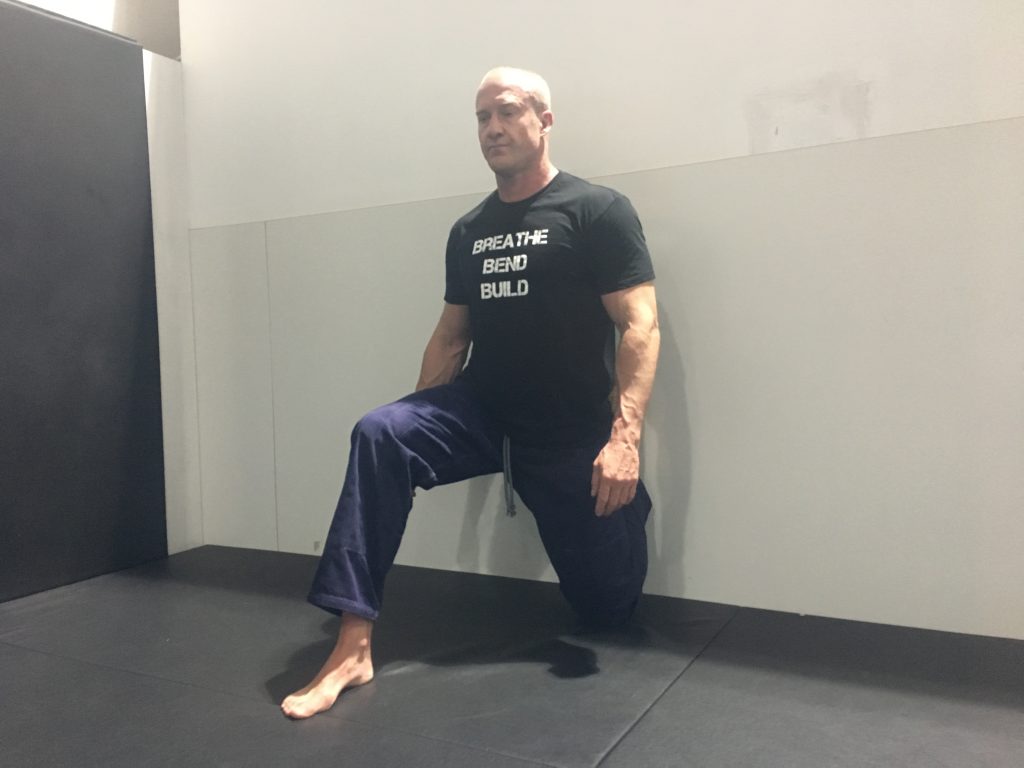
Shoulders
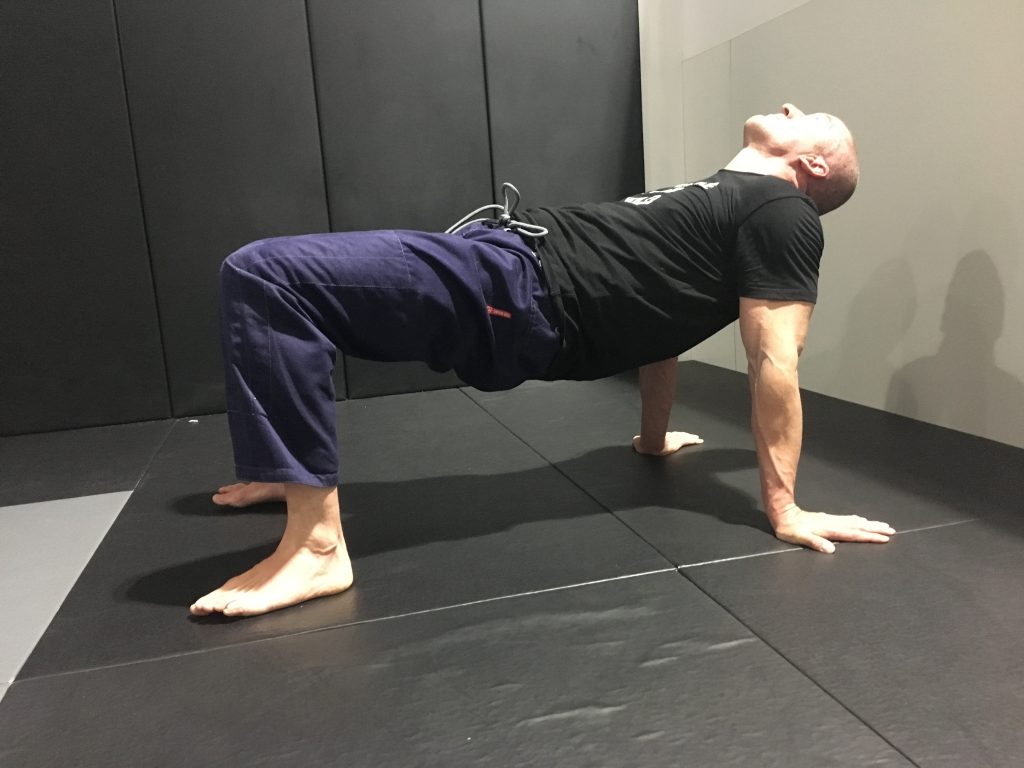
Neck
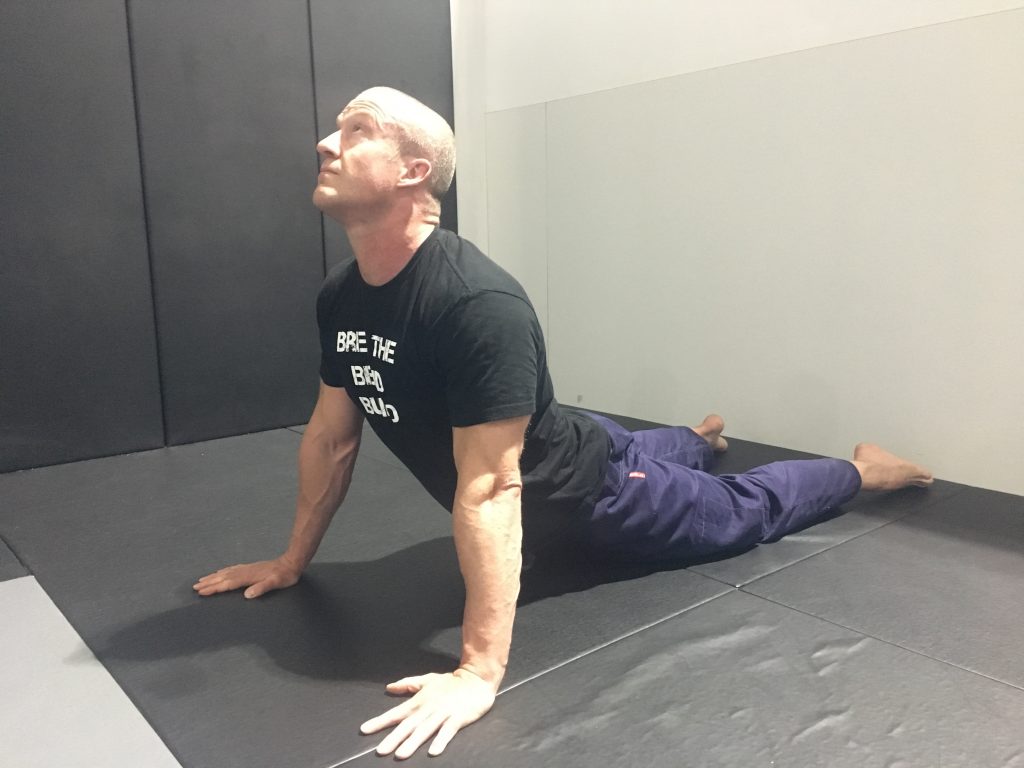
Combination of spine/ shoulders
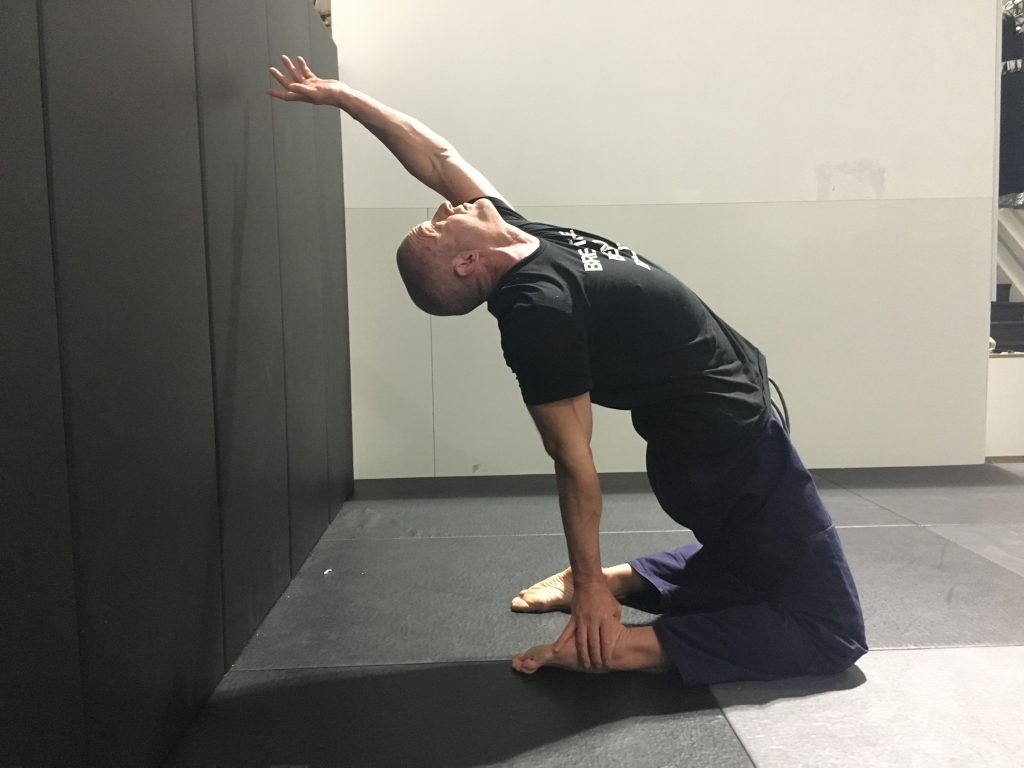
Hips and shoulders

Hit these after every on the mat session and you’ll notice you don’t feel like a stiff old man after each session. Taking the time to properly col down and normalise your body after training will help you deal with training far better as well as help prevent injuries brought on by being too stiff to perform certain moves. And you never know – a little extra time spent on flexibility and you might even start pulling off a few berimbolos in class.
Why Should You Listen to Andrew:
 Master RKC (Russian Kettlebell Certified instructor – the only Australian ever promoted to this level).
Master RKC (Russian Kettlebell Certified instructor – the only Australian ever promoted to this level).- Certified Kettlebell Functional Movement Specialist
- Certified Indian Club Specialist
- National Director Primal Move
- Qualified Olympic and Power Coach through the Australian Weightlifting Federation
- Ironman Triathlete
- Author for – Blitz, Ultrafit, Inside MMA, International Kickboxer, Oxygen and Breaking Muscle.
- Lectured in Australia, USA, China and Korea.
Check out more great info from Andrew here: ReadPT.com




